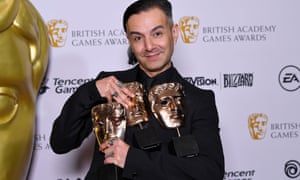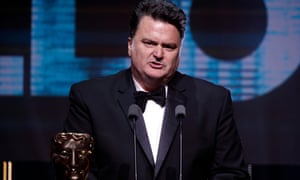
Hellblade: Senua’s Sacrifice, a dark mythological adventure that follows a young warrior suffering from psychosis, was the big winner at the 2018 Bafta video game awards on Thursday night at Tobacco Dock, London.
The game, which was developed in conjunction with psychologists and neuroscientists to ensure its accurate depiction of mental illness, was nominated in nine categories and won for best British game, best performance, artistic achievement, audio achievement and a new category, games beyond entertainment, which celebrates new releases with a political or social message.
Accepting the latter prize, psychologist Paul Fletcher, a professor of neuroscience at Cambridge University who worked closely with the game’s Cambridge-based developer, Ninja Theory, said: “Mental illness is usually characterised by the fact that it’s invisible. Working with Ninja Theory has shown me something valuable: games can aspire to and achieve a remarkable exploration of state of the mind and mental suffering.”
 However, the night’s biggest award, best game, also provided its biggest shock. Although big hitters such as The Legend of Zelda: Breath of the Wild, Super Mario Odyssey and Assassin’s Creed Origins were all in the running, the judges went for What Remains of Edith Finch, a narrative adventure set in the ramshackle home of a tragic Washington family, developed by small Californian studio, Giant Sparrow.
However, the night’s biggest award, best game, also provided its biggest shock. Although big hitters such as The Legend of Zelda: Breath of the Wild, Super Mario Odyssey and Assassin’s Creed Origins were all in the running, the judges went for What Remains of Edith Finch, a narrative adventure set in the ramshackle home of a tragic Washington family, developed by small Californian studio, Giant Sparrow.
Even the team responsible for the game was caught out. On accepting the award, one staff member said, “I wrote speeches for all the other awards we were nominated in, but I figured this one would be given in Japanese” – a reference to the Nintendo-developed Mario and Zelda titles, which were clear favourites.
This wasn’t the only unexpected decision. Game of the moment Fortnite missed out on all the prizes it was nominated for, with the multiplayer award going to role-playing adventure Divinity: Original Sin 2, and evolving game going to Overwatch.
Elsewhere, Nintendo had a good evening, confirming the company’s return to form with the Switch console after the embarrassing blip of the Wii U. Super Mario Odyssey won in the game design and family game categories while The Legend of Zelda: Breath of the Wild took innovation.
Completing the night, the post-apocalyptic adventure Horizon Zero Dawn won original property, 1930s-inspired Cuphead took music, offbeat sports sim Golf Clash triumphed in mobile and the idiosyncratic small-town drama Night in the Woods won narrative. Best debut game went to the beautiful puzzle box Gorogoa.

This year’s Bafta fellowship, the Academy’s special award recognising a lifetime’s contribution to the arts, went to Tim Schafer, co-writer of classic “point-and-click” adventure titles Full Throttle, Day of the Tentacle and Grim Fandango. Now director of developer-publisher Double Fine, Schafer was praised as an innovator and supporter of emerging talent, producing games for promising indie teams as well as creating offbeat titles such as Psychonauts and Brütal Legend.
Accepting his award, he said: “My career has had so many near-death experiences; it would have ended if it wasn’t for the help of so many people. It has encouraged me to keep that rolling, to support people. We need new voices, new perspectives to come and shake things up, to come from groups that haven’t been represented in games before, and to tell new stories. To throw a big spanner into the works.”
It was a night on which the growing diversity and inclusivity of the video games industry, historically dominated by and marketed towards men and featuring a surfeit of white male protagonists, was loudly celebrated. In his introduction to the ceremony David Gardner, vice-president of the awards, said: “Bafta is aware that the future of our industry depends on diverse voices and talents coming through. Bullying, abuse and harassment have no place.”
Later, the star of Assassin’s Creed Origins, Abubakar Salim, spoke about the performance category, in which he was nominated. “It’s five women and a big black guy,” he said. “We’re extremely proud to be part of the games industry, an industry which is clearly leading the way for new cultural and social norms, and evolving in ways that the rest of the entertainment industry is finally catching up to.”
source:-.theguardian
